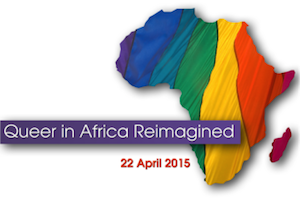Symposium: Queer in Africa reimagined


Organisers: Dr Zethu Matebeni (HUMA, UCT),
Prof Surya Monro (University of Huddersfield, UK);
and Prof Vasu Reddy (Human Sciences Research Council, SA)
There is a pressing need for academic and activist engagement with issues concerning African ‘non-normative’ sexual identities, sexual rights agendas and health-related agendas, and the interfaces between faith, nationalism, genders and sexualities. This one-day symposium on ‘Queer in Africa Reimagined’ is being organised by Dr Zethu Matebeni (University of Cape Town), Professor Vasu Reddy (Human Sciences Research Council) and Professor Surya Monro (University of Huddersfield, UK). It builds on the success of “Queer in Africa: confronting the crisis” symposium convened in Cape Town in June 2014), taking forward some of the key emerging debates and developing new insights. The workshop will be interdisciplinary, drawing on – and speaking to – the disciplines of Humanities, Sociology, Politics, Social Policy, Public Health, Psychology, and Law. Whilst focusing on the African continent, the workshop will also have a comparative international slant, including some discussion of transnational sexualities and genders.
We seek to create space for the safe but stimulating exploration of the following themes and questions:
- Erotics, desires and pleasures: – sexual cultures, intimacies, and relationship forms
- Sexual rights make people human: The importance of sexual citizenship to human dignity and freedom. Issues concerning LGBTQI people and security, social organising, sexual and relationship rights, parenting rights, and rights to migrate
- Naming ourselves: How do we name ourselves – under what conditions, and why? How do we remain visible, or stay invisible? Who names us and what are the effects? What identity terms/categories are useful – for example lesbian, women who have sex with women – and when? What new ways of naming ourselves are there?
- Global and local: How do globalised categories influence the local? Are people developing categories at a local level that can become global?
- Policy and Politics: What policies and organisations support LGBTQI peoples’ rights? What role do organisations working in the HIV/AIDS field play? What legislation supports – or blocks – the LGBTQI rights agenda? How do funding processes impact in this area?
This will be a small, invitation-only workshop (approximately 15 presenters) in which we will seek to push forward knowledge, informing future activism, policy interventions and scholarship. We have sought contributions from both activists and academics, with the plan of putting together working activist/academic writing partnerships before the workshop.
Speakers at the workshop will present a piece of work that is being developed for publication, based either on their activism, or their research/theoretical work, or both. The workshop will be based on the presentation of developed draft chapters and discussion of them. We will be focusing on working on chapters for publication in an edited collection (anticipated Routledge: Critical Diversities series) in 2016-7. The commissioning editor has already shown a keen interest in the proposed book.
